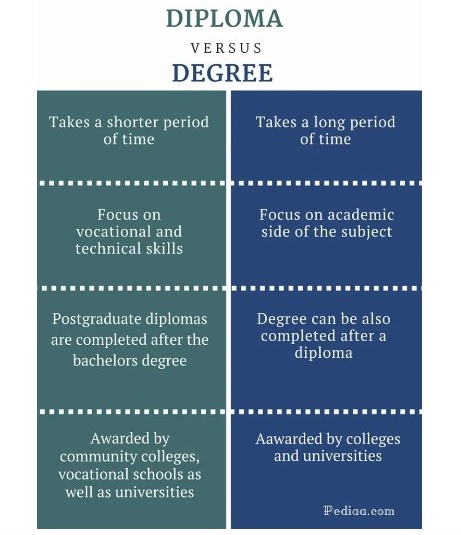Degree Vs Diploma: Who Wins The Battle?
31st May 2023

Let us picture a real-life scenario where you have passed your higher secondary and the first question that comes to your mind is which course you should take up and whether you should choose a degree or diploma. While your parents and relatives expect you to take the traditional route you need to do your research and decide based on your strengths, skills, and interests. Read on to explore the key differences between degrees vs diplomas, shedding light on their unique characteristics to help you make informed decisions about their educational and professional paths.
What Do You Understand By Degree?
A degree is an academic qualification awarded by universities or higher education institutions upon completion of a prescribed course of study. Pursuing a degree involves a more in-depth exploration of a particular field or discipline. It typically requires a longer duration of study, ranging from three to five years, depending on the program and country.
Degrees provide comprehensive knowledge and understanding of a subject, covering theoretical concepts, practical applications, and research-based learning. They often require students to undertake a wide range of courses, including core subjects, electives, and general education requirements. Degrees are commonly categorized into undergraduate (e.g., Bachelor's degree) and postgraduate (e.g., Master's degree, Doctorate) levels, each offering varying levels of specialization and research opportunities.
Perks And Perils Of A Degree
The advantages of enrolling in a degree program are:
- It broadens your knowledge and improves your skill sets
- Better earning potential
- More networking opportunities
- More marketable and learning new skills like analysis and critical thinking
Some of the disadvantages include:
- The programs can be expensive
- It takes a lot of time to complete
- All the theories and standard procedures might kill your imagination
What Do You Understand By A Diploma?
On the other hand, diplomas are more specialized, skill-oriented programs that focus on practical training and career-specific skills. They are typically offered by technical institutes, vocational schools, community colleges, or polytechnic institutions. Diplomas are designed to equip students with practical knowledge and hands-on expertise in a particular profession or trade.
Diploma programs are relatively shorter in duration, usually ranging from six months to two years. The curriculum is tailored to meet industry demands and provides targeted training in specific areas, such as healthcare, information technology, hospitality, or graphic design. These programs often include internships or work placements, allowing students to gain real-world experience and develop industry-specific skills.
Pros And Cons of A Diploma
Some of the benefits of a diploma are:
- They are cost-effective
- You can complete the courses in a relatively shorter time
- The curriculum is focused on industry-related skills
However, certain drawbacks include:
- The value and compensation for diploma holders are lower
- Opportunities overseas might be difficult to come by depending on your field
What Do Employers Want: A Degree or Diploma?
While no employer states that they specifically desire candidates with a degree or diploma, it is best to understand your needs and choose accordingly. Are you looking for a rapid skill upgradation or do you have the luxury of time to complete a lengthy program?

Degrees often offer broader career opportunities and pathways. Graduates with degrees may pursue a wide range of professions, including research, academia, management, or specialized roles within their field. Degrees are often seen as a prerequisite for advanced academic pursuits, such as pursuing a Master's degree or Professional Doctorate., which can open doors to higher positions and specialized research opportunities.
Diplomas, on the other hand, focus on immediate job placement and are well-suited for individuals seeking hands-on, practical roles. Diploma holders are often sought after by industries looking for skilled professionals in specialized areas. While diplomas may provide immediate employment prospects, individuals seeking career advancement or higher-level positions may find it beneficial to pursue further education, such as a degree, to broaden their horizons and explore new opportunities.
Thus, it is vital to assess your own objectives before deciding which one to get.
Tread Smartly Towards Your Ideal Career.
There is no better or worse when it comes to education. It all depends on your personal preferences and the time, money, and effort you are willing to invest. A lot of it also has to do with your learning objectives as well, like what are you expecting to get out of the program. If you are a working professional it is strongly suggested to go for fast-track online degree programs as they will not only be completed sooner than the traditional ones but will also give you a chance to upgrade yourself with the in-demand skills.
Written By: Sheetal Sharma